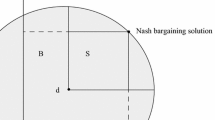Abstract
The Nash-Harsanyi theory of bargaining is usually taken as the correct theory of rational bargaining, and, as such, as the correct theory for the basic political contract for a society. It grafts a theory of cooperation to a base that essentially articulates the perspective of non-cooperative interaction. The resultant theory is supposed make clear how rational bargaining can fully realize the mutual gains that cooperation can make possible. However, its underlying commitment to the concepts of non-cooperative interaction renders this doubtful. I argue for an alternative theory—the theory of Full Cooperation—that avoids this difficulty. As applied to bargaining over the basic political contract, it calls for the selection of the most egalitarian of the Strictly Pareto-Optimal outcomes. This is essentially a version of Rawls’ principle of Justice as Fairness, but it is derived, unlike Rawls’ theory, without appeal to a problematic theory of individual decision-making behind the veil of ignorance. It also provides an alternative basis for what Hart calls the Principle of Mutual Restrictions, and what Rawls’ calls the Duty of Fair Play.
Similar content being viewed by others
References
Atiyah P. (1989) The rise and fall of freedom of contract. Clarendon Press, Oxford
Arrow K. J. (1963) Social choice and individual values (2nd ed.). Yale University Press, New Haven
Arrow, K. J. (1969). The organization of economic activity: Issues pertinent to the choice of market versus Nonmarket allocation. In The analysis and evaluation of public expenditures: The PPB system, joint economic committee compendium, 91st congress, 1st session, Vol. 1, pp. 47–64.
Barry B. (1989) Theories of justice: A treatise on social justice. Harvester Wheatsheaf, London
Binmore, K. (1994; 1998) Game theory and the social contract (Vols. I–II) Cambridge, MA: The MIT Press.
Buchanan J., Tullock G. (1962) The calculus of consent: Logical foundations of constitutional democracy. University of Michigan Press, Ann Arbor
Edgeworth F. (1881) Mathematical psychics. C. K. Paul and Company, London
Fehr E., Schmidt K. M. (1999) A theory of fairness, competition and cooperation. Quarterly Journal of Economics, 114: 817–868
Fehr, E., Fischbacher, U., & Gachter, S. (2003) Strong reciprocity, human cooperation and the enforcement of social norms. Economics Working paper Archive at WUSTL, no. 0305008.
Fisher, A. R. J., & McClennen, E. F. (2011) The Pareto argument for inequality revisited (unpublished ms).
Fudenberg D., Tirole J. (1992) Game theory. MIT Press, Cambridge, MA
Gauthier D. (1986) Morals by agreement. Oxford University Press, New York
Gauthier D. (1993) Uniting separate persons. In: Gauthier D., Sugden R. R. (eds) Rationality, justice and the social contract. Harvester Wheatsheaf, Hertfordshire, pp 176–192
Harsanyi J. C. (1956) Approaches to the bargaining problem before and after the theory of games: A critical discussion of Zeuthen’s. Hicks, and Nash’s theories. Econometrica 24: 144–157
Harsanyi J. C. (1963) A simplified bargaining model for the n-person cooperative game. International Economic Review 4(2): 194–220
Hart H. L. A. (1955) Are there any natural rights?. The Philosophical Review 64: 175–191
Hobbes, T. (1991 [1651]). In R. Tuck (Ed.). Leviathan. Cambridge: Cambridge University Press.
Kadane J. B., Larkey P. D. (1982) Subjective probability and the theory of games. Management Science 28(2): 113–126
Kaysen, K. (1946/1947). A revolution in economic theory. Review of Economic Studies, 14(1), 1–15.
Kreps D. M. (1990) Game theory and economic modeling. Clarendon Press, Oxford
Luce R. D., Raiffa H. (1957) Games and decisions: Introduction and critical survey. John Wiley & Sons, Inc, New York
Mannheim, K. ([1936] 1968). Ideology and Utopia: An introduction to the sociology of knowledge (trans. Wirth & Shils) New York: Harcourt, Brace & World.
Nash J. (1950) The bargaining problem. Econometrica 18: 155–162
Nash J. (1951) Non-cooperative games. Annals of Mathematics 54(2): 286–295
Nash J. (1953) Two-person cooperative games. Econometrica 21: 128–140
Pettit P. (1997) Republicanism: A theory of freedom and government. Clarendon Press, Oxford
Rawls J. (1958) Justice as fairness. Philosophical Review 57: 164–194
Rawls J. (1971) A theory of justice. The Belknap Press of Harvard University Press, Cambridge, MA
Sen A., Foster J. (1997) On economic inequality. Oxford University Press, Oxford
Schelling T. C. (1960) The strategy of conflict. Harvard University Press, Cambridge
Sugden R. (1986) The economics of rights, co-operation and welfare. Basil Blackwell, Inc, Oxford
Sugden R. (1999) Conventions. In: Peter N. (eds) The New Palgrave dictionary of economics and the law. MacMillan, New York
Temkin L. (1993) Inequality. Oxford University Press, New York
Von Neumann J., Morgenstern O. (1953) Theory of games and economic behavior (3rd ed.). Princeton University Press, Princeton
Author information
Authors and Affiliations
Corresponding author
Rights and permissions
About this article
Cite this article
McClennen, E. Rational cooperation. Synthese 187, 65–93 (2012). https://doi.org/10.1007/s11229-011-0032-4
Received:
Accepted:
Published:
Issue Date:
DOI: https://doi.org/10.1007/s11229-011-0032-4




